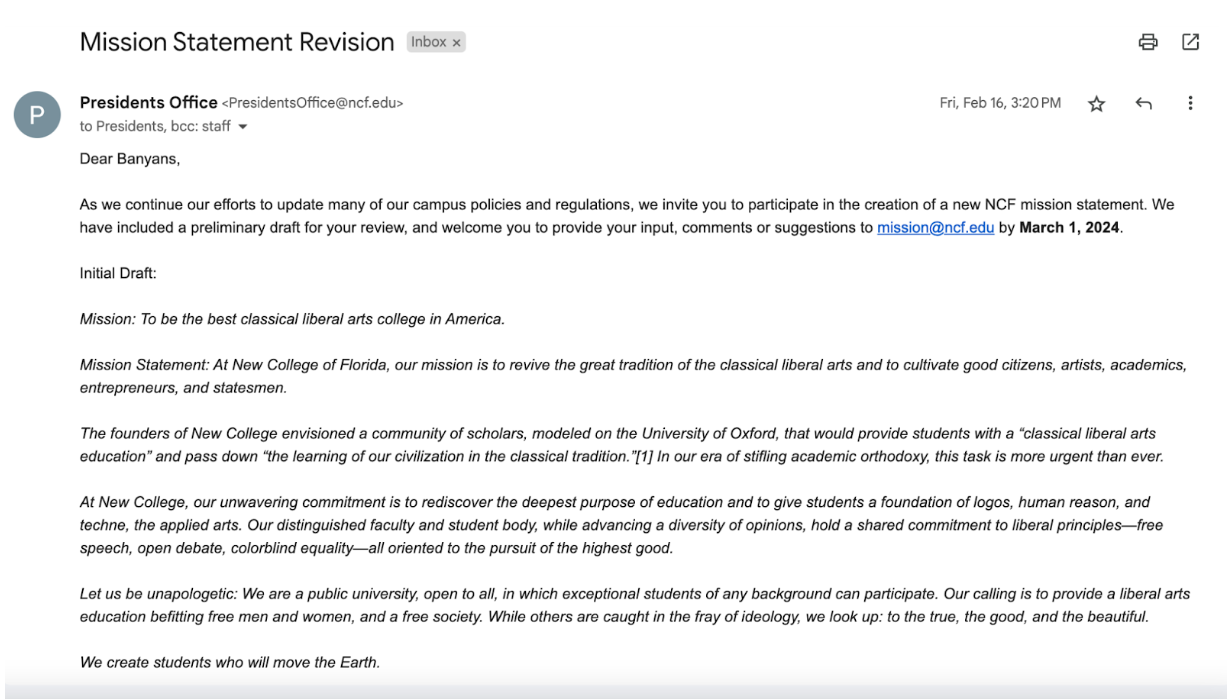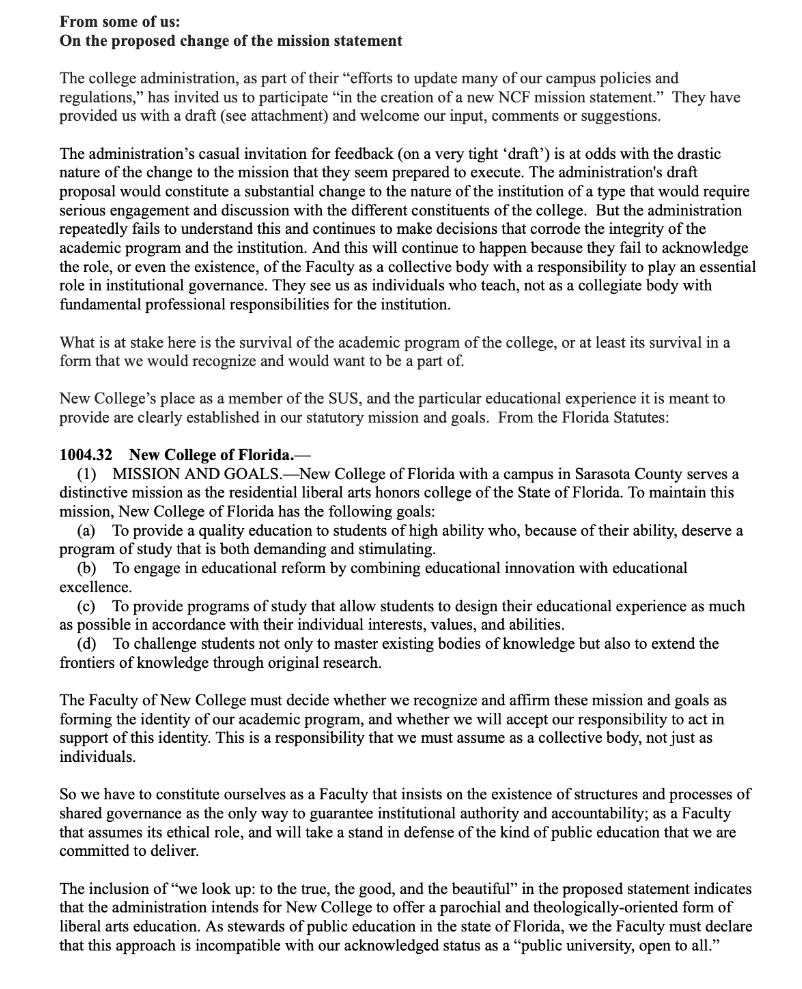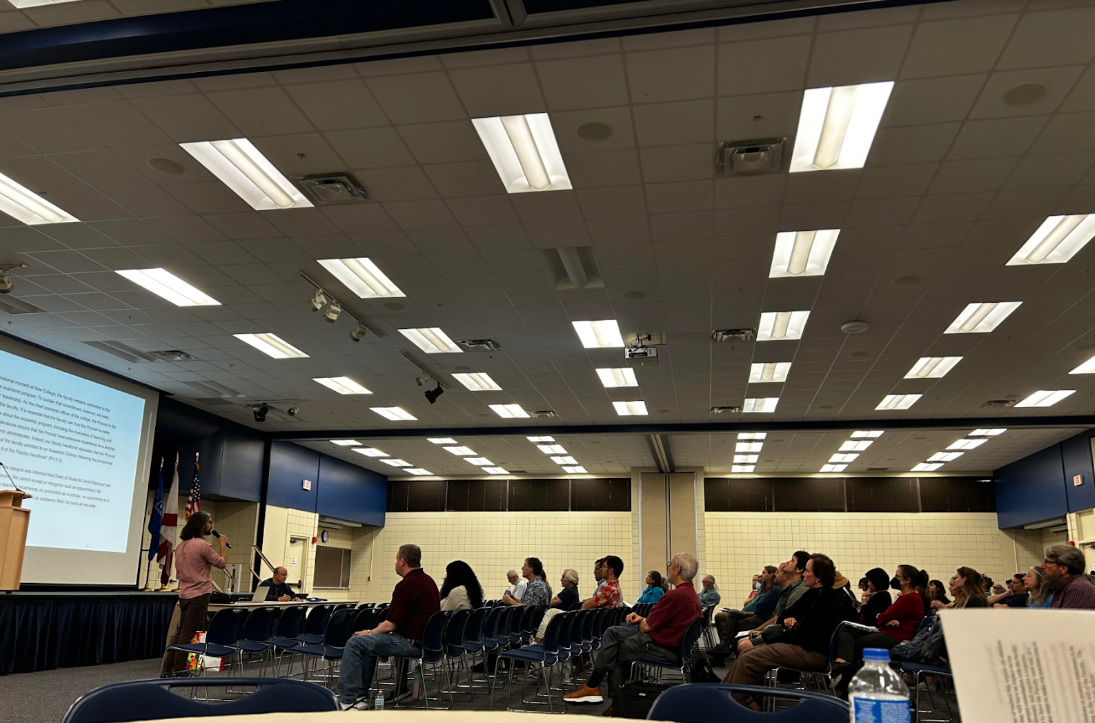By Veronica Jolley and Isaac Tellechea
At its regular monthly meeting on March 13, the New College faculty passed a resolution highlighting “the necessity of having a Provost with qualifications, expertise, and leadership skills to both support the faculty and the academic program, and to serve a critical collaborative role in the shared governance of the institution.” The faculty also urged President Richard Corcoran to “initiate as soon as possible an open and accountable search process for a regular Provost by a search committee comprised of elected, not appointed, representatives from the student body and all three academic divisions.” This resolution came to fruition following the events of a special faculty meeting held on Feb. 28, when New College professors gathered at the Sudakoff Conference Center with multiple agenda items up for discussion.
These items included a draft document focused on faculty response to the appointment of former Dean of Students David Rancourt as Interim Provost, a draft statement on the proposed change to the school’s mission statement and developing more effective internal and external communication strategies as a cohesive faculty group. The meeting was led by Faculty Co-Chairs Professor of Spanish Language and Literature Jose Portugal and Professor of French Language and Literature Amy Reid. Three Catalyst reporters were present.
On Feb. 16, President Richard Corcoran announced that Rancourt had been promoted to the position of Interim Provost. The promotion came as a surprise to faculty. The factor that concerned them the most was that Rancourt is unqualified for the position. “This is not personal, not political, just a concern that he has no academic qualifications to hold that position,” Portugal told his colleagues.
Faculty noted the important role a Provost plays in the university system, acting as a buffer or enforcer of the Board of Governors’ policies. Across universities, the Provost is typically a tenured professor and has a long-standing academic record in a specific field. The New College Faculty Handbook states that the Provost should be a member of the faculty, admitted to an academic division following the procedures described in Chapter 4.
The Provost is the chief academic officer, a leader of and advocate for the faculty. According to Professor of Philosophy Aron Edidin, the Office of the Provost is crucial to the success of a college and its faculty.
Given Rancourt’s sudden appointment, Portugal voiced the difficulty search committees face with making promises to new faculty that the correct procedures will be followed, when procedures such as those for appointing a new Provost are not.
There was also discussion that former Interim Provost Bradley Theissen was having difficulty executing his role. “He listens, knows how to keep us accredited, but there’s a bottleneck in that he can’t get anything done,” Humanities Division Chair and Professor of Music Maribeth Clark stated. “The Provost has not had the autonomy that office should have.”
Discussion of new mission statement initial draft
Following the conversation surrounding Rancourt as Interim Provost, Portugal transitioned the faculty’s focus to the administration’s proposed new mission statement. On Feb. 16, the same day that students, staff and faculty were notified of Rancourt’s promotion, the community also received an email from the President’s Office which contained the initial draft.

The email stated that the creation of the new mission statement would be part of the President’s Office’s efforts to “update many campus policies and regulations.” Community members were given the opportunity to provide emailed “input, comments or suggestions” by Mar. 1.
“What are the values on which we are going to stand moving forward?” Portugal asked his assembled colleagues. “We are going to need to have a more proactive position and affirm ourselves as a faculty.”
Portugal read a one-page document, “On the proposed change of the mission statement,” drafted by a group of faculty members including himself. The document examines aspects of the administration’s decision to request community feedback, which the faculty authors claim “is at odds with the drastic nature of the change to the mission that they seem prepared to execute.” Their statement draws attention to the administration’s failure to understand that such proposed changes would require “serious engagement and discussion with the different constituents of the college.” Furthermore, the group states that the proposal to change New College’s current mission statement puts the survival of the academic program of the college at stake, specifically “survival in a form that we [the faculty] would recognize and want to be a part of.”

The document continues by including New College’s current mission and goals as outlined in the Florida Statutes. The faculty authors conclude the document by pointing to a specific phrase in the proposed mission statement draft that “indicates that the administration intends for New College to offer a parochial and theologically-oriented form of liberal arts education.” The final words assert that we the Faculty must declare that this approach is incompatible with our acknowledged status as a ‘public university, open to all.”
Portugal continued this portion of the meeting by reading the draft of the administration’s proposed mission statement and then opened the discussion for faculty members to chime in. People expressed distaste for the mission statement draft, with many comparing it to the school’s current missions and goals and stating a preference for the language used in the Florida Statutes.
“What we currently have as a mission statement is a freedom to perceive the world in different ways,” Associate Professor of Sociology and Caribbean and Latin American Studies Sarah Hernandez said to her colleagues. Hernandez suggested the new draft does not describe the same freedom. Faculty comments also took notice of the use of the word ‘colorblind’ in the statement, as well as the failure to mention student autonomy.
Towards the end of the mission statement discussion, Professor of Political Science Barbara Hicks suggested taking a vote on whether to formally publish the presented draft document to express the faculty’s position. By this point, multiple attendees had left the meeting, so to avoid excluding any voices from any major decisions, Portugal suggested taking a “Sense of the Faculty” so that he and Reid could understand how their colleagues felt. A vote by a show of hands indicated unanimous support of reaffirming the faculty’s commitment to the current mission statement as given in Florida Statute 1004.32. Portugal confirmed that a document describing the Sense of the Faculty would be emailed to all faculty members, as well as to President Richard Corcoran. The document stated that “if the administration would like to engage in a serious discussion of the mission statement with the collective faculty under the principles of shared governance, we would be glad to set up a reasonable process for mutual deliberation.”
Speaking with the Faculty Co-Chairs
In an interview with the Catalyst following the meeting, Reid and Portugal identified specific facets of the proposed mission statement that caused concern among faculty.
“The mission statement that the administration presented is a radical departure from [what we currently have],” Portugal said. “The problem is that there is a whole statement about a particular type of approach to the classics. There are some religious undertones in the way that it is presented. It is also a statement of hostility towards other institutions. But the essential part is that the consecration of the whole academic program to be devoted to a particular approach to the classics. I would say a very narrow approach to the classics. It seems to go against everything that the college is about.”
“The statement seems perhaps more ideological than educational,” Reid added.
Portugal confirmed that the Sense of the Faculty was delivered to President Richard Corcoran following the Feb. 28 meeting; the Catalyst is not aware of any significant updates since.
“In fairness, we have not yet had an official approach to this matter, I’ve only had an informal approach with the President when I delivered this,” Portugal shared. “There was an understanding that the process as constructed was not enough. He has an idea of what he wants to do next. We have an idea of what we want to do next. We have not yet had that conversation.”
Portugal emphasized that discussions on the matter will take time.
“It’s clear for both sides that more is needed to be done before we get to a final conclusion,” Portugal concluded. “I want to be really fair… We are not going to rush this thing. We hope we’ll be able to sit down and talk and see how it works.”
Reid and Portugal also further discussed the concerns surrounding Rancourt’s promotion to Interim Provost. “If you look at job expectations across colleges and universities, the Provost is someone that has a respected academic career and has the confidence of the faculty,” Reid said.
Portugal explained the Provost is the most important voice before reaching the President in terms of all cases of evaluation for tenure and promotion. “So a person who has not had the experience, a person that has not had the recognition and who doesn’t have that standing will be someone that will not necessarily be seen as an authority to judge this,” Portugal said.
As Portugal stated during the Feb. 28 meeting, this has consequences internally because potential and current faculty want to know if the tenure process they will go through will be guided according to standards, and that the individuals who are involved in the different stages are people who are qualified and understand the procedures of the institution and the profession.
“Externally it’s an issue because people look into how the college is organized—who are the people, the leadership—and that gives indication also of what is the understanding of the value of an academic program,” Portugal continued. “It is also reflected in the quality of the people who are guiding it, from the President to the Provost.”
Portugal reiterated that faculty have made it clear it’s not a personal criticism of the power of the President to appoint the Provost, as this is written in the Faculty Handbook. Reid and Portugal agreed that they are dealing with a mismatch between the wisdom of the decision and how it operates within the frameworks of the institution [New College].
As chairs, one of the problems they’re working to avoid is a break in trust. Portugal commented that institutions like New College are heavily dependent on trust. “When trust breaks it’s very difficult… There are ways of making decisions that exacerbate suspicions and concerns.
“We don’t have the power to decide, we only can advise,” he continued. “But if advice is not heard, all we have is what we’re doing right now—the possibility of talking and letting people know what our position is.”

